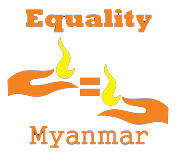TERMS OF REFERENCE
FOR CONSULTANT FOR STORYBOOK DEVELOPMENT
- Organizational Background
- Equality Myanmar (EQMM), formerly known as the Human Rights Education Institute of Burma (HREIB), is a nongovernmental organization that facilitates a broad range of human rights education activities, advocacy programs, and research projects which target civil society organizations and grassroots communities. EQMM conducts trainings of trainers (ToTs), basic and thematic human rights trainings, community events, and in-depth workshops at its centers in Yangon and Mandalay as well as throughout Myanmar. The organization also provides customized human rights trainings to organizations working on various issues around the country.
Since its establishment in 2000, EQMM (formerly HREIB) has trained over 1,000 women, university students, monks and pastors, activists, school teachers, and community leaders, building a strong network of
human rights trainers and advocates across the country as well as along Myanmar’s border regions.
With administrative offices in Myanmar and Thailand and Human Rights Education Training Centers based in Yangon and Mandalay, EQMM aims to formalize civil society networks dedicated to coordinating advocacy efforts, hosting community awareness events, and dialoguing with other stakeholders on human
rights issues.
Terms of Reference Page 2
youth participants will have knowledge, technical skills, and resources to enable them to continue promoting respect for diversity in their communities through a variety of storytelling and performance methods. As a multiplier of the project, the ideas and stories gathered from the youth will inform the development of two information, education, and communication (IEC) products: (1) a storybook about diversity targeting youth readers that will be translated into local languages (Rakhine, Mon, Karen) and disseminated in target areas; and (2) a report documenting the current situation faced by youth and lessons learned about promoting
respect for diversity, intended for use by educators, NGOs, government, embassies, and human rights bodies.


 Equality Myanmar (EQMM) is a leading nongovernmental organization that organises a wide range of human rights education and advocacy programs, the documentation human rights violations, and provides emergency support for activists, human rights defenders, and their families. We work with a range of local civil society organizations, educators, activists, various local actors, and our programs and activities reach all states and regions in Myanmar.
Equality Myanmar (EQMM) is a leading nongovernmental organization that organises a wide range of human rights education and advocacy programs, the documentation human rights violations, and provides emergency support for activists, human rights defenders, and their families. We work with a range of local civil society organizations, educators, activists, various local actors, and our programs and activities reach all states and regions in Myanmar.